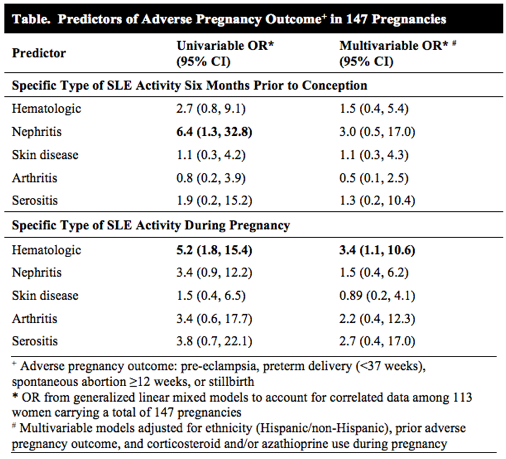Session Information
Date: Tuesday, November 10, 2015
Title: Reproductive Issues in Rheumatic Disorders: Basic and Clinical Aspects Poster Session
Session Type: ACR Poster Session C
Session Time: 9:00AM-11:00AM
<>Background/Purpose: Previous studies have found a
relationship between overall systemic lupus erythematosus (SLE) activity and adverse
pregnancy outcomes. We sought to investigate whether specific types of SLE
activity either in the 6 months prior to conception or during pregnancy were
related to adverse pregnancy outcome.
<>
<>Methods: We identified women with confirmed SLE by 1997 ACR Revised Criteria, >2
visits to our Lupus Center, and ³1 pregnancy lasting >12 weeks from
1990-2013. Data collected from electronic medical record included demographics,
SLE medications and labs, obstetric history, pregnancy outcomes, and presence
of 5 specific types of SLE activity 6 months before conception and during
pregnancy: hematologic (WBC <4K, hemolytic anemia, or platelets <100K), nephritis
(proteinuria >0.5g/d, WBC or RBC >5, or casts), serositis (pleuritis or
pericarditis), arthritis (>1 joint), and skin (discoid or malar rash). Adverse
pregnancy outcome was defined as pre-eclampsia, preterm delivery (<37
weeks), spontaneous abortion ³12 weeks, or stillbirth. Univariable analyses
identified predictors of adverse pregnancy outcome. Multivariable analyses
evaluated each specific type of SLE activity as a primary predictor of adverse
outcome, adjusting for significant univariable predictors. Generalized linear
mixed models were used for both univariable and multivariable analyses to account
for correlated data, as some women had >1 pregnancy.
<>
<>Results: 147 pregnancies occurred in 113 women with mean age 23.7
(SD 6.8) years at SLE diagnosis and 31.0 (SD 5.3) at conception. 68% were
White, 15% Hispanic, 10% Black, 7% Asian. Five women had a history of
antiphospholipid syndrome and 21 had a prior adverse pregnancy outcome. During
the study period, 38 (26%) pregnancies had an adverse outcome. Hematologic
disorder (16%) and nephritis (10%) were the most common types of SLE activity during
pregnancy. In univariable analyses, nephritis 6 months before conception (OR
6.4, 95%CI [1.3, 32.8]) and hematologic disorder during pregnancy (OR 5.2 [1.8,
15.4]) were significantly associated with adverse outcome. Hispanic ethnicity,
prior adverse pregnancy outcome, and steroid and/or azathioprine use during
pregnancy were also associated with adverse outcome. In multivariable analyses,
only hematologic disorder during pregnancy was associated with adverse outcome
(OR 3.4 [1.1, 10.6]). (Table)
<>
<>Conclusion: The majority of pregnancy outcomes were favorable
in this SLE cohort. After adjusting for ethnicity, prior adverse pregnancy
outcomes, and medications during pregnancy, only hematologic disorder during
pregnancy was associated with an elevated risk of adverse pregnancy outcome. Prior
studies have suggested variable impact of lupus nephritis on pregnancy outcomes,
but this study uniquely demonstrates an association between cytopenia during
pregnancy and adverse pregnancy outcomes.
relationship between overall systemic lupus erythematosus (SLE) activity and adverse
pregnancy outcomes. We sought to investigate whether specific types of SLE
activity either in the 6 months prior to conception or during pregnancy were
related to adverse pregnancy outcome.
<>
<>Methods: We identified women with confirmed SLE by 1997 ACR Revised Criteria, >2
visits to our Lupus Center, and ³1 pregnancy lasting >12 weeks from
1990-2013. Data collected from electronic medical record included demographics,
SLE medications and labs, obstetric history, pregnancy outcomes, and presence
of 5 specific types of SLE activity 6 months before conception and during
pregnancy: hematologic (WBC <4K, hemolytic anemia, or platelets <100K), nephritis
(proteinuria >0.5g/d, WBC or RBC >5, or casts), serositis (pleuritis or
pericarditis), arthritis (>1 joint), and skin (discoid or malar rash). Adverse
pregnancy outcome was defined as pre-eclampsia, preterm delivery (<37
weeks), spontaneous abortion ³12 weeks, or stillbirth. Univariable analyses
identified predictors of adverse pregnancy outcome. Multivariable analyses
evaluated each specific type of SLE activity as a primary predictor of adverse
outcome, adjusting for significant univariable predictors. Generalized linear
mixed models were used for both univariable and multivariable analyses to account
for correlated data, as some women had >1 pregnancy.
<>
<>Results: 147 pregnancies occurred in 113 women with mean age 23.7
(SD 6.8) years at SLE diagnosis and 31.0 (SD 5.3) at conception. 68% were
White, 15% Hispanic, 10% Black, 7% Asian. Five women had a history of
antiphospholipid syndrome and 21 had a prior adverse pregnancy outcome. During
the study period, 38 (26%) pregnancies had an adverse outcome. Hematologic
disorder (16%) and nephritis (10%) were the most common types of SLE activity during
pregnancy. In univariable analyses, nephritis 6 months before conception (OR
6.4, 95%CI [1.3, 32.8]) and hematologic disorder during pregnancy (OR 5.2 [1.8,
15.4]) were significantly associated with adverse outcome. Hispanic ethnicity,
prior adverse pregnancy outcome, and steroid and/or azathioprine use during
pregnancy were also associated with adverse outcome. In multivariable analyses,
only hematologic disorder during pregnancy was associated with adverse outcome
(OR 3.4 [1.1, 10.6]). (Table)
<>
<>Conclusion: The majority of pregnancy outcomes were favorable
in this SLE cohort. After adjusting for ethnicity, prior adverse pregnancy
outcomes, and medications during pregnancy, only hematologic disorder during
pregnancy was associated with an elevated risk of adverse pregnancy outcome. Prior
studies have suggested variable impact of lupus nephritis on pregnancy outcomes,
but this study uniquely demonstrates an association between cytopenia during
pregnancy and adverse pregnancy outcomes.
Disclosure: S. K. Tedeschi, None; H. Guan, None; A. Fine, None; B. Lu, None; K. H. Costenbader, Arthritis Care and Research, 5,International Journal of Clinical Practice, 5; B. Bermas, None.
To cite this abstract in AMA style:
Tedeschi SK, Guan H, Fine A, Lu B, Costenbader KH, Bermas B. Hematologic Disorder during Pregnancy Associated with Adverse Pregnancy Outcomes Among Women with Systemic Lupus Erythematosus [abstract]. Arthritis Rheumatol. 2015; 67 (suppl 10). https://acrabstracts.org/abstract/hematologic-disorder-during-pregnancy-associated-with-adverse-pregnancy-outcomes-among-women-with-systemic-lupus-erythematosus/. Accessed .« Back to 2015 ACR/ARHP Annual Meeting
ACR Meeting Abstracts - https://acrabstracts.org/abstract/hematologic-disorder-during-pregnancy-associated-with-adverse-pregnancy-outcomes-among-women-with-systemic-lupus-erythematosus/

